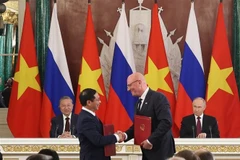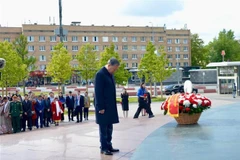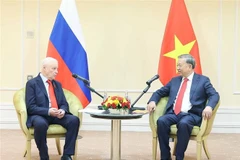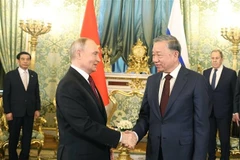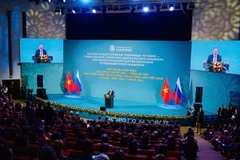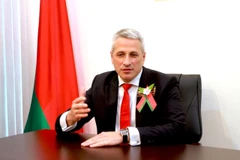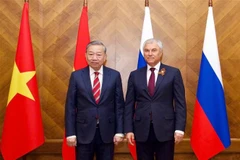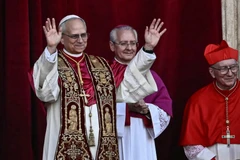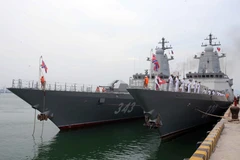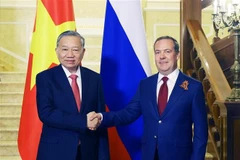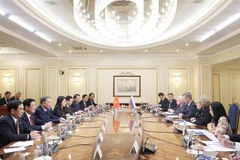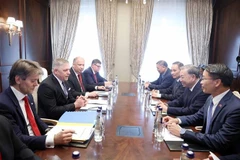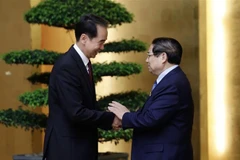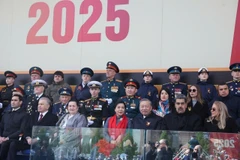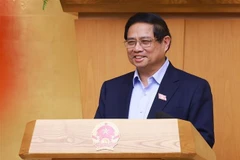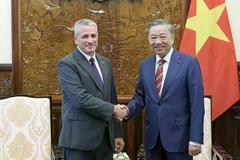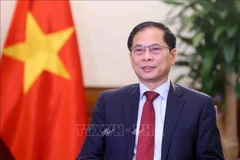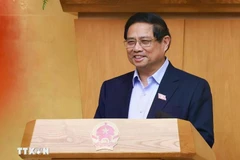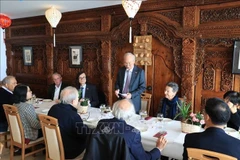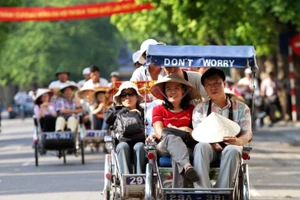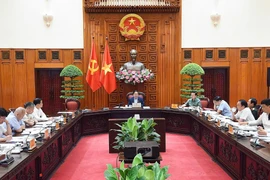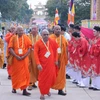Minh made the remarks in his article entitled “Vietnam’s diplomacy reaches new heights” which is published on the occasion ofthe 67th founding anniversary of diplomacy (August 28).
Diplomacy has taken the lead in creating a peaceful and stableenvironment and taken advantage of the best external sources to servenational security and development.
The foreign policy of independence, self-reliance, openness, diversification and multilateralism in the spirit that “Vietnam is ready to make friends with countries in the internationalcommunity, for peace, independence and development” has helped diplomacymature.
Vietnam has set updiplomatic ties with over 180 out of 193 members of the United Nationsand trade ties with nearly 230 countries and territories worldwide. Thecountry has also performed as an active member of more than 70 regionaland international organisations.
To date, Vietnam has established 98 representative offices in countries and territories, in five continents worldwide, Minh said.
For the first time in the country’s foreign history, Vietnam has successfully completed its role as a non-permanent member of the UN Security Council for the term 2008-2009 and the ASEAN Chairmanship in 2010.
With such efforts, Vietnam ’s role and position in the international arena have been heightened, the diplomat affirmed.
The minister commented on a wide range of important diplomaticactivities in all fields, both bilaterally and multilaterally, withpriority given to deepening the relationship with neighbouringcountries, then regional and major partners.
General Secretary of the Communist Party of Vietnam (CPV)Nguyen Phu Trong, President Truong Tan Sang, Prime Minister Nguyen TanDung and National Assembly Chairman Nguyen Sinh Hung conducted a seriesof high-level visits to countries in the Asia-Pacific such as China,Russia, ASEAN members, Japan, the Republic of Korea and India as well asin Latin America such as Cuba, he noted.
At the same time, Vietnam welcomed many foreign State and Government leaders, he added.
Such diplomatic activities have brought concrete outcomes, including the Vietnam-EUPartnership and Cooperation Agreement (PCA) signed on June 27, 2012which has opened up a new period for comprehensive relations between Vietnam and the EU.
The relationship between Vietnam and Russia has also been lifted to a “comprehensive strategicpartnership”. Strategic partnership with Germany and the same withDenmark in climate change, environment, energy and green growth wereestablished in 2011, raising the country’s number of strategic partnersto ten, Minh said.
Vietnam is on the way to elevating the relationship with other prioritised and important partners, he added.
Diplomats have closely coordinated with other sectors such as nationalsecurity and defence, propaganda-ideology and other foreign policyactors to form a firm bloc in protecting the country’s sovereignty overseas and islands.
In the context that the EastSea situation has seen many unfavourable developments in 2011-2012,diplomacy has worked as a compass for the CPV and State leaders dealingdirectly with emerging problems, contributing to protecting thecountry’s sovereignty and territorial integrity as well as security anddevelopment interests.
The agreement on basic principles guiding the resolution of maritime issues between Vietnam and China, which was signed during the visit to China by CPV General Secretary Nguyen Phu Trong in October last year, has created an important framework to address possible changes.
After ten years of the signing of the Declaration on the Conduct of Parties in the East Sea (DOC), with Vietnam ’sactive and proactive contributions, ASEAN and China have adoptedguidelines on the implementation of the DOC. The bloc itself alsoreached consensus on basic components of the Code of Conduct in the EastSea (COC), creating a foundation for negotiations with China andrelated parties to boost cooperation, for peace and stability in theEast Sea .
Diplomacy has promoted Vietnam ’s contributions to building the ASEAN Community, strengtheningsolidarity and cooperation within the bloc and increasing ASEAN’scentral role in the regional structure which is taking shape.
After successfully fulfilling the role of the ASEAN Chairmanship in 2010, Vietnam has stood side by side with following Chairs, including Indonesia(2011) and Cambodia (2012), to bring the 10-member group aheadtowards the ASEAN Community.
Economic diplomacy has also proven its significant role in comprehensive diplomacy.
The sector has made the best use of international cooperation andoutside sources to serve the country’s development and removesocio-economic difficulties while actively supporting ministries,branches, localities and businesses in export, investment, tourismdevelopment and official development assistance, and working withrelated branches to deal with international economic and trade disputes.
Although the world economy is suffering a lot of changes, economic and trade ties between Vietnam andleading partners such as China, the US, Japan, the Republic of Korea(RoK), the EU and Russia has increased compared with the previous years.
Five years after joining the World TradeOrganisation (WTO), the country’s export turnover rose by 97.7 percent,representing an average annual increase of 19.52 percent.
Vietnam has participated in the Trans-Pacific Partnership (TPP)negotiations, while conducted negotiations with a number of importantpartners such as the EU, the RoK, the European Free Trade Associationand the Russia-Belarus-Kazakhstan Customs Union on Free TradeAgreements.
Cultural diplomacy hascontributed to raising the country’s position, further tightening itsrelations with partners and promoting its image to internationalfriends.
Over the past year, the sector hasattained remarkable achievements with the most worthy of note beingUNESCO’s recognition of Vietnam’s heritages such as the Ho Dynasty Citadel, Xoan singing and printedwood blocks with Buddhist Sutras in Vinh Nghiem pagoda, as worldcultural heritages.
Overseas Vietnameseaffairs and resident protection have also been implemented effectively,contributing to protecting the legitimate rights and interests ofresidents, fishermen and workers, Minh noted.
The diplomat, however, underlined huge future tasks for diplomacy,including continuing to consolidate a peaceful and stable environment toserve national development and the protection of sovereignty andterritorial integrity.
Other tasks include furtherheightening the country’s position in the region and the world,contributing to peace, national independence, democracy and socialprogress, the minister said.-VNA
